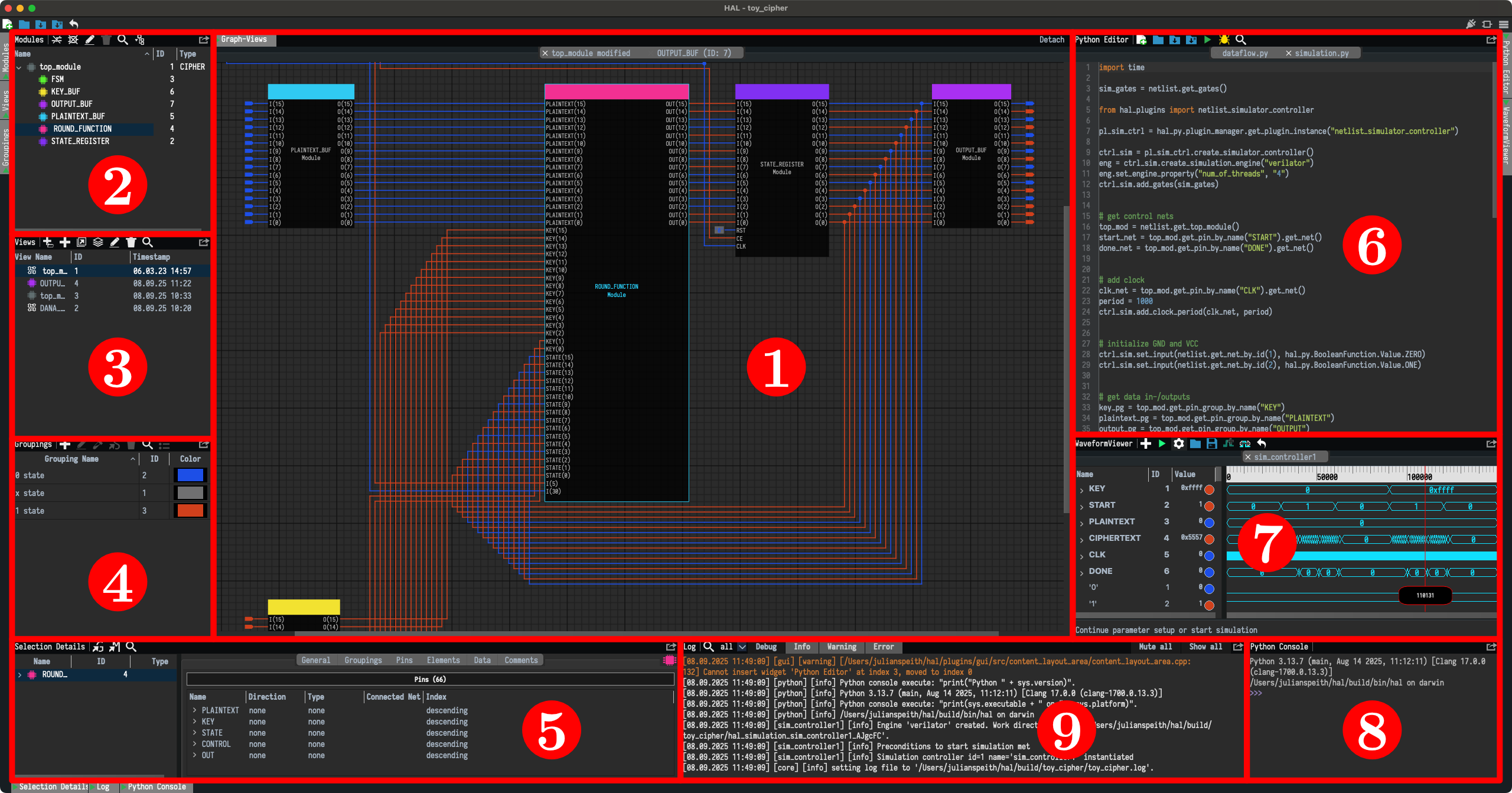HAL [/hel/] is a comprehensive reverse engineering and manipulation framework for gate-level netlists focusing on efficiency, extendability and portability. HAL comes with a fully-fledged plugin system, allowing to introduce arbitrary functionalities to the core.
Apart from multiple research projects, HAL is also used in our university lecture Introduction to Hardware Reverse Engineering.
- Natural directed graph representation of netlist elements and their connections
- Support for custom gate libraries
- High performance thanks to optimized C++ core
- Modularity: write your own C++ Plugins for efficient netlist analysis and manipulation (e.g. via graph algorithms)
- A feature-rich GUI allowing for visual netlist inspection and interactive analysis
- An integrated Python shell to exploratively interact with netlist elements and to interface plugins from the GUI
- Update v2.0.0:
- Heavily improved VHDL and Verilog parsers
- Updated CMake build system to use target-based configurations
- Changes to gate library system
- Replaced BDDs with Boolean functions
- Major changes to internal representation of gate types
- Allows for differentiation between LUTs, flip-flops, latches and combinational gate types
- Flip-flops and latches may now specify special sequential inputs such as enable, clock, set, and reset
- Replaced JSON gate libraries with liberty files
- Simplified plugin system
- Included igraph library
- Major GUI revision
- Added isolation view/cone view feature
- New layouting system
- Added support for hierarchization/modularization
- Tons of bug fixes and smaller issues ...
The C++ documentation is available here. The Python documentation can be found here.
Install or build HAL and start the GUI via hal -g. You can list all available options via hal [--help|-h].
We included some example netlists in examples together with the implementation of the respective example gate library in plugins/example_gate_library.
For instructions to create your own gate library and other useful tutorials, take a look at the wiki.
Load a library from the examples directory and start exploring the graphical representation.
Use the integrated Python shell or the Python script window to interact. Both feature (limited) autocomplete functionality.
Let's list all lookup tables and print their Boolean functions:
for gate in netlist.get_gates():
if "LUT" in gate.type.name:
print("{} (id {}, type {})".format(gate.name, gate.id, gate.type.name))
print(" {}-to-{} LUT".format(len(gate.input_pins), len(gate.output_pins)))
boolean_functions = gate.boolean_functions
for name in boolean_functions:
print(" {}: {}".format(name, boolean_functions[name]))
print("")For the example netlist fsm.vhd this prints:
FSM_sequential_STATE_REG_0_i_3_inst (id 4, type LUT6)
6-to-1 LUT
O: (!I1 & !I2 & I3 & !I4 & I5) | (I0 & !I2) | (I0 & I1) | (I0 & I3) | (I0 & I4) | (I0 & I5)
FSM_sequential_STATE_REG_0_i_2_inst (id 3, type LUT6)
6-to-1 LUT
O: (I2 & I3 & I4 & !I5) | (I1 & !I5) | (I1 & !I4) | (I1 & !I3) | (I0 & I1) | (I1 & I2)
FSM_sequential_STATE_REG_1_i_3_inst (id 6, type LUT6)
6-to-1 LUT
O: (!I1 & I4 & !I5) | (!I1 & !I3 & I4) | (I0 & I4 & !I5) | (I0 & !I3 & I4) | (!I1 & I2 & I4) | (I0 & I2 & I4) | (!I2 & !I5) | (!I2 & !I4) | (!I2 & !I3) | (!I0 & !I4) | (!I0 & !I2) | (!I0 & !I1) | (I1 & !I4) | (I1 & !I2) | (I0 & I1) | (I3 & !I5) | (I3 & !I4) | (!I0 & I3) | (I1 & I3) | (I2 & I3) | (!I4 & I5) | (!I3 & I5) | (!I0 & I5) | (I1 & I5) | (I2 & I5)
FSM_sequential_STATE_REG_1_i_2_inst (id 5, type LUT6)
6-to-1 LUT
O: (!I0 & I1 & !I2 & I3 & I4 & !I5) | (I0 & !I2 & I3 & I4 & I5)
OUTPUT_BUF_0_inst_i_1_inst (id 18, type LUT1)
1-to-1 LUT
O: !I0
OUTPUT_BUF_1_inst_i_1_inst (id 20, type LUT2)
2-to-1 LUT
O: (I0 & !I1) | (!I0 & I1)
If you use HAL in an academic context, please cite the framework using the reference below:
@misc{hal,
author = {{Chair for Embedded Security}},
publisher = {{Ruhr University Bochum}},
title = {{HAL - The Hardware Analyzer}},
year = {2019},
howpublished = {\url{https://github.com/emsec/hal}},
}Feel free to also include the original paper
@article{2018:Fyrbiak:HAL,
author = {Marc Fyrbiak and
Sebastian Wallat and
Pawel Swierczynski and
Max Hoffmann and
Sebastian Hoppach and
Matthias Wilhelm and
Tobias Weidlich and
Russell Tessier and
Christof Paar},
title = {{HAL-} The Missing Piece of the Puzzle for Hardware Reverse Engineering,
Trojan Detection and Insertion},
journal = {IEEE Transactions on Dependable and Secure Computing},
year = {2018},
publisher = {IEEE},
howpublished = {\url{https://github.com/emsec/hal}}
}Please contact us via our Slack workspace. Get your invite here:
HAL releases are available via it's own ppa. You can find it here: ppa:sebastian-wallat/hal
Use the following commands to install hal via homebrew.
brew tap emsec/hal
brew install halRun the following commands to download and install HAL.
git clone https://github.com/emsec/hal.git && cd hal- To install all neccessary dependencies execute
./install_dependencies.sh mkdir build && cd buildcmake ..make
Optionally you can install HAL:
make install
Please make sure to use a compiler that supports OpenMP. You can install one from e.g. Homebrew via: brew install llvm.
To let cmake know of the custom compiler use following command.
cmake .. -DCMAKE_C_COMPILER=/usr/local/opt/llvm/bin/clang -DCMAKE_CXX_COMPILER=/usr/local/opt/llvm/bin/clang++
You are very welcome to contribute to the development of HAL. Feel free to submit a new pull request via github. Please consider running the static checks + clang format before that. You can also install these checks as git hooks before any commit.
To install clang-format hook install git-hooks and run:
git hooks --install
Start Docker build via:
docker-compose run --rm hal-build
git log $(git describe --tags --abbrev=0)..HEAD --pretty=format:"%s" --no-merges
HAL is licensed under MIT License to encourage collaboration with other research groups and contributions from the industry. Please refer to the license file for further information.
HAL is at most alpha-quality software. Use at your own risk. We do not encourage any malicious use of our toolkit.



